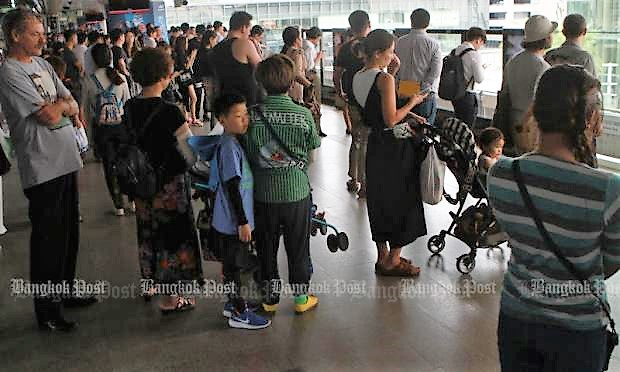
The BTS skytrain operator will announce on Thursday how it intends to compensate commuters for the inconvenience of days of signal malfunctions which caused train delays and mass passenger congestion all last week.
Bangkok Mass Transit System Plc (BTSC) chief executive officer Surapong Laoha-unya made the commitment after the National Broadcasting and Telecommunications Commission (NBTC) inspected skytrain services, checking for signal interference, on Monday.
The BTSC on Friday completed installation of new signal transceivers and switched to a new frequency spectrum for its radio communication system to avoid further signal interference by telecom service signals, which caused the problems last week.
The details of the planned "passenger remedial policy" were still being finalised by the BTSC board, Mr Surapong said. Thursday's announcement will also be about a crisis management policy, in case similar problems resurface in the future, he added.
NBTC secretary-general Takorn Tantasith on Monday gave skytrain services a thumbs-up, saying no signal malfunctions were detected during the inspection by officials of the commission, Bangkok Metropolitan Administration (BMA) and Transport Ministry, who travelled on the train from Ari to Phrom Phong stations.
Mr Takorn said the skytrain network has switched to using a 2,430-2,495 megahertz (MHz) frequency spectrum across its entire route.
The previous malfunctions were due to the network using a spectrum near the end of the 2,300MHz spectrum, which was too close to the frequency used by state-owned TOT Plc's telecommunications services, the NBTC reportedly found. The firm reportedly uses a 2,300-2,370MHz spectrum.
"The BTS had been using the older spectrum with communication systems from Motorola Solutions since 2009, before TOT began using it," Mr Takorn said.
"Once TOT started using it, BTS did not change to a new spectrum. The skytrain network is now using frequencies that are on average 70MHz away from TOT's spectrum, so no more malfunctions will occur."
BTSC has now also switched to using new transceivers from Canada-based Bombardier Inc. According to the firm, the new system offers signal protection to prevent interference.
Bombardier states the BTS signals are now "around 95% protected".
"We are confident that passengers using the skytrain network will not experience the same problems as they did last week," Mr Surapong said. "The newly-fitted systems are more advanced than the former."
Mr Takorn said the NBTC had on Sunday submitted compiled reports from inspections conducted on the skytrain network over the last week to the Bangkok Metropolitan Administration (BMA), the concession-provider.
The reports would be used in deciding remedial action, he added.
BMA deputy governor Sakonthee Phattiyakul, who attended Monday's inspections, said the administration will hold talks with BTSC next week to discuss further solutions to the train delays inflicted on passengers.
He said the firm could not be fined for the delays last week because "it was not directly responsible for the malfunctions".
Ridership on the BTS Silom and Sukhumvit lines is more than 700,000 trips a day, according to the company's website.